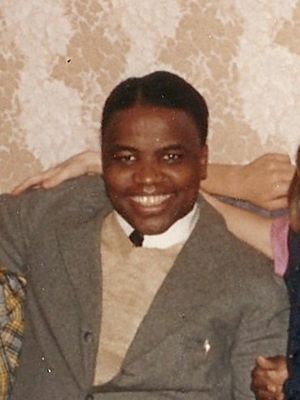Ndabaningi Sithole facts for kids
Quick facts for kids
Ndabaningi Sithole
|
|
|---|---|

Sithole in 1955
|
|
| Member of Parliament of Zimbabwe for Chipinge South |
|
| In office 1995–2000 |
|
| Preceded by | Goodson Sithole |
| Succeeded by | Wilson Khumbula |
| Personal details | |
| Born | 21 July 1920 Nyamandhlovu, Rhodesia |
| Died | 12 December 2000 (aged 80) Philadelphia, Pennsylvania, US |
| Political party | ZANU (1963–1975) ZANU–Ndonga (after 1975) |
| Spouse | Vesta Zvamwaida Sithole |
| Children | 5 |
| Alma mater | Andover Newton Theological School |
Ndabaningi Sithole (born July 21, 1920 – died December 12, 2000) was an important leader in Zimbabwe's history. He helped create the Zimbabwe African National Union (ZANU) in July 1963. This group worked to end colonial rule in Rhodesia (now Zimbabwe).
Sithole was a minister in the United Church of Christ in Zimbabwe (UCCZ). He spent 10 years in prison after the government banned ZANU. Later, ZANU split into different groups, and he lost the 1980 elections to Robert Mugabe.
Contents
Early Life and Education
Ndabaningi Sithole was born in Nyamandhlovu, Southern Rhodesia, on July 21, 1920. He went to the United States to study teaching from 1955 to 1958. In 1958, he became a Methodist minister.
While studying in the U.S., he attended the Andover Newton Theological School. His book, African Nationalism, was published and then quickly banned by the government. This event made him decide to get involved in politics.
Founding ZANU
Sithole was one of the main people who started the Zimbabwe African National Union (ZANU) party in August 1963. He worked with Herbert Chitepo, Robert Mugabe, and Edgar Tekere. This happened after ZANU separated from another political group called ZAPU.
In 1964, at a party meeting in Gwelo, Sithole was chosen as president. He then appointed Robert Mugabe to be his secretary general.
Challenges and Imprisonment
The government led by Ian Smith banned ZANU in 1964. On June 22, 1964, Sithole was arrested along with Mugabe and other leaders because of their political actions. He spent 10 years in prison. While he was in prison, he asked Herbert Chitepo to continue the fight for independence from outside the country.
Sithole was accused of planning against the government and was released from prison in 1974.
Party Split and New Path
On March 18, 1975, Herbert Chitepo was killed in Lusaka, Zambia. After this, Robert Mugabe was chosen to lead ZANU. Later that year, the party split. Many Ndebele followers joined Joshua Nkomo's group, ZAPU.
Sithole then started a new party called ZANU-Ndonga. This party decided to stop using violence to achieve its goals. Meanwhile, the ZANU group led by Mugabe (now called ZANU PF) continued with a more forceful approach.
Sithole joined Abel Muzorewa's temporary government in 1979. He also attended the Lancaster House Agreement talks, which prepared the way for new elections. However, his ZANU-Ndonga Party did not win any seats in the 1980 elections.
Life in Exile and Return
Sithole felt his life was in danger from political enemies, so he left Zimbabwe. He lived in the United Kingdom in the early 1980s and then in the United States around 1984. He returned to Zimbabwe in January 1992.
Later Political Career
In 1995, he was elected to parliament for his home area of Chipinge in southeastern Zimbabwe. He also ran for president in 1996 but withdrew before the election. In December 1997, a court found him guilty of plotting against Robert Mugabe, and he was not allowed to attend parliament. However, his small opposition group won the Chipinge seat again in the June 2000 elections.
He was allowed to appeal the court's decision and was granted bail because his health was getting worse.
Death and Legacy
Ndabaningi Sithole passed away on December 12, 2000, in Philadelphia, Pennsylvania, United States. He wrote three books about African politics. He is survived by his wife, Vesta, and five adult children.
His farm, "Porta Farm," was bought legally in 1992. Later, the government took the farm. Sithole had allowed some people who had lost their homes in Harare to stay on his farm because he felt it was a human rights issue. This made the government unhappy, and they carried out an operation to remove the people and then took the farm.
Books Written by Sithole
Ndabaningi Sithole was a very active Black author in Rhodesia. He published 12 books, including a novel called The Polygamist in 1972.
Images for kids
See also
 In Spanish: Ndabaningi Sithole para niños
In Spanish: Ndabaningi Sithole para niños


